Daily Vocabulary Words: List of Daily Used Words in Leading International Newspapers
Hi there. Welcome to this special section @ Wordpandit.
Our endeavour here is very simple: to highlight important daily vocabulary words, which you would come across in leading newspapers in the country. We have included the following newspapers in our selection:
• The New York Times
• The Washington Post
• Scientific American
• BBC
• The Guardian
• Psychology Today
• Wall Street Journal
• The Economist
We are putting in extensive work for developing your vocabulary. All you have got to do is be regular with this section and check out this post on a daily basis. This is your repository of words that are commonly used and essentially, we are posting a list of daily used words. Hence, this has significant practical application as it teaches you words that are used commonly in leading publications mentioned above.
Visit the website daily to learn words from leading international newspapers.
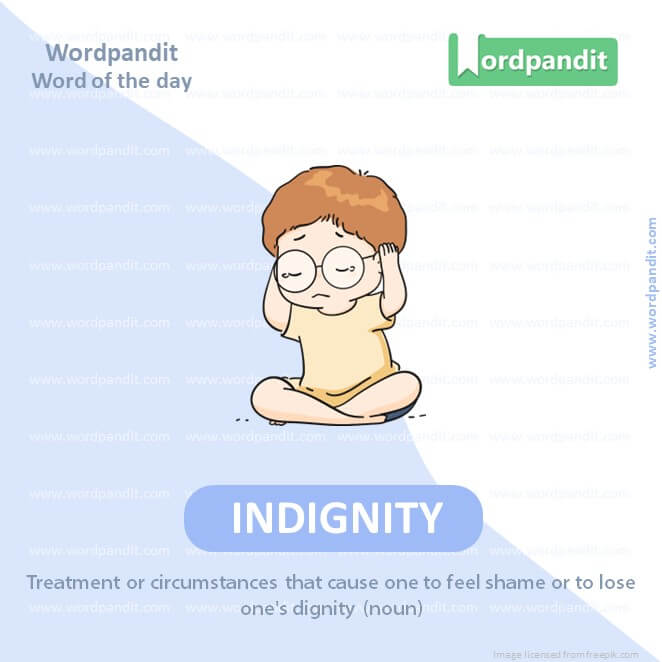
WORD-1: INDIGNITY
CONTEXT: Bruni refers to those who let you know that some representative of a wronged party is under threat as the “indignity sentries of Twitter.”
SOURCE: Indian Express
EXPLANATORY PARAGRAPH: Imagine someone laughing at you when you trip and fall. It might make you feel embarrassed or upset. That feeling is called “indignity.” It means feeling humiliated or disrespected because of what someone did or said.
MEANING: Treatment or circumstances that cause one to feel shame or to lose one’s dignity (noun).
PRONUNCIATION: in-DIG-ni-tee
SYNONYMS: humiliation, insult, offense, disgrace, affront
USAGE EXAMPLES:
1. He suffered the indignity of being excluded from the meeting.
2. The prisoners faced various indignities during their capture.
3. She endured the indignity of being ignored.
4. It was an indignity to be falsely accused.
WORD-2: GOADING
CONTEXT: But goading people into a constant sense of alarmism distracts from actual wrongdoing in the world.
SOURCE: Indian Express
EXPLANATORY PARAGRAPH: Imagine trying to make your friend run faster by teasing them or challenging them. That’s called “goading.” It means pushing someone to do something, usually by annoying or provoking them a little.
MEANING: Provoking or annoying someone so as to stimulate some action or reaction (verb).
PRONUNCIATION: GOH-ding
SYNONYMS: provoking, spurring, urging, inciting, stimulating
USAGE EXAMPLES:
1. He was goading her into a debate.
2. The crowd was goading the speaker with difficult questions.
3. She resisted the goading of her competitors.
4. His friends were goading him to jump into the pool.
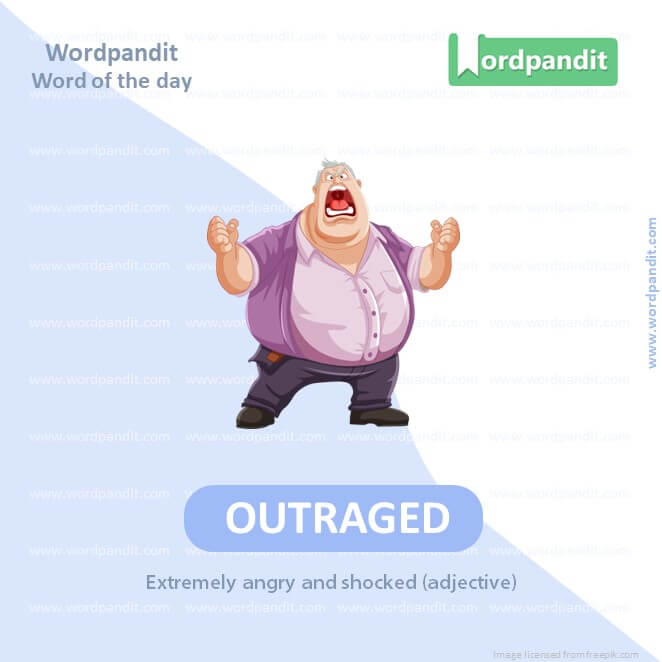
WORD-3: OUTRAGED
CONTEXT: It seems to satisfy no one, and people are more outraged than ever. Even those who hate Tucker Carlson become Tucker Carlson.
SOURCE: Indian Express
EXPLANATORY PARAGRAPH: Imagine seeing someone being unfair or mean to a puppy. You might feel really angry and want to do something about it. That feeling is called “outraged.” It means being very angry and upset because something is not right or is unfair.
MEANING: Extremely angry and shocked (adjective).
PRONUNCIATION: ow-TRAJD
SYNONYMS: infuriated, incensed, angered, offended, appalled
USAGE EXAMPLES:
1. The community was outraged by the unjust decision.
2. She was outraged at the poor treatment of the animals.
3. News of the scandal left the public outraged.
4. He expressed his outraged feelings through a letter to the editor.
WORD-4: PRECINCTS
CONTEXT: Followed by them saying, “But you know I’m not voting for the guy.” Out of that reality came the plan known as “fortress precincts.”
SOURCE: Indian Express
EXPLANATORY PARAGRAPH: Imagine different areas in your school, like the playground, cafeteria, or classroom—each is a special area for certain activities. “Precincts” are like that but in a town or city. They are areas that are used for specific purposes, like voting or police areas.
MEANING: Districts or areas within a defined boundary, typically used for administrative, police, or voting purposes (noun).
PRONUNCIATION: PREE-sinkts
SYNONYMS: districts, sectors, zones, areas, regions
USAGE EXAMPLES:
1. The police officer patrolled his precinct diligently.
2. Voting results varied significantly across different precincts.
3. The new shopping center is in the downtown precinct.
4. Community events are held in various precincts of the city.
WORD-5: RENDITION
CONTEXT: Mr. Trump opens his rallies with a rendition of the national anthem by a group of men imprisoned for their parts in the Jan. 6 insurrection, on which he also recites the Pledge of Allegiance. “I am your retribution” is a long way from “I am a uniter, not a divider” and “Hope and Change.”
SOURCE: Indian Express
EXPLANATORY PARAGRAPH: Imagine you and your friends telling the story of “Little Red Riding Hood,” but everyone tells it a little differently. Each way the story is told is called a “rendition.” It means a version of something, like a story or a song, that someone presents in their own way.
MEANING: A version or interpretation of something (noun).
PRONUNCIATION: ren-DISH-un
SYNONYMS: interpretation, version, performance, representation, portrayal
USAGE EXAMPLES:
1. Her rendition of the national anthem was very unique.
2. The film is a modern rendition of a classic fairy tale.
3. Each actor brings his own rendition to the character.
4. The band gave a live rendition of their latest single.
WORD-6: AEROSOLIZED
CONTEXT: According to many public health officials, the virus load in the infected cows’ milk is especially high, raising the possibility that the disease is being spread through milking machines or from aerosolized spray when the milking room floors are power washed.
SOURCE: Indian Express
EXPLANATORY PARAGRAPH: Imagine you have a spray bottle filled with water. When you squeeze the handle, the water comes out as a fine mist. That mist is like being “aerosolized.” It means turning something into tiny particles that can float in the air, just like the mist from the spray bottle.
MEANING: Converted into a fine spray or mist (verb).
PRONUNCIATION: AIR-uh-suh-lized
SYNONYMS: atomized, vaporized, misted, sprayed, dispersed
USAGE EXAMPLES:
1. The medication was aerosolized for easier breathing treatment.
2. Aerosolized particles can spread diseases if not properly controlled.
3. They used an aerosolized paint for a smoother finish.
4. Aerosolized pesticides are applied to crops via drones.
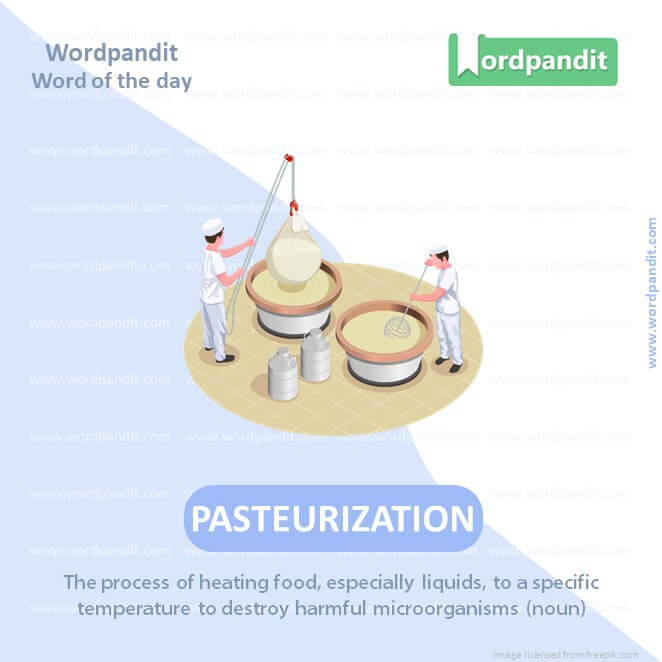
WORD-7: PASTEURIZATION
CONTEXT: it tells me it hasn’t completed specific tests to confirm that pasteurization would make milk from infected cows safe, though the agency considers it “very likely” based on extensive testing for other pathogens.
SOURCE: Indian Express
EXPLANATORY PARAGRAPH: Imagine you have a glass of milk, but before you drink it, you heat it up a little to get rid of any germs that might make you sick. That process of heating the milk is called “pasteurization.” It’s a way to make food safe to eat by killing harmful bacteria.
MEANING: The process of heating food, especially liquids, to a specific temperature to destroy harmful microorganisms (noun).
PRONUNCIATION: pahs-CHUR-ih-zay-shun
SYNONYMS: sterilization, sanitization, disinfection, cleansing, heating
USAGE EXAMPLES:
1. Pasteurization of milk helps prevent diseases like tuberculosis.
2. The juice undergoes pasteurization to extend its shelf life.
3. Many dairy products are safe to consume thanks to pasteurization.
4. He studied the effects of pasteurization on different bacteria.
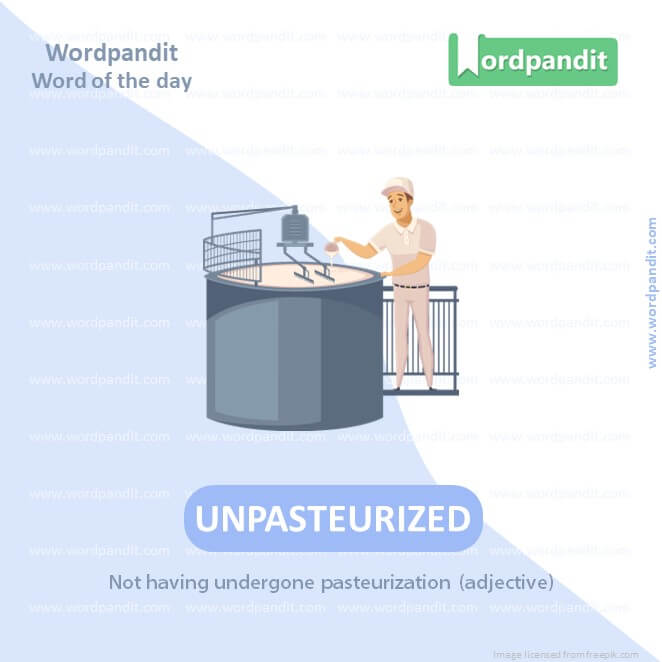
WORD-8: UNPASTEURIZED
CONTEXT: In any case, unpasteurized milk remains legal in many states. Dr. Bright told me that “this is a major concern, especially given recent infections and deaths in cats that have consumed infected milk.”
SOURCE: Indian Express
EXPLANATORY PARAGRAPH: Imagine if you have milk that has not been heated to get rid of germs, just like it comes straight from the cow. This kind of milk is called “unpasteurized.” It means the milk hasn’t gone through the process to kill the bacteria.
MEANING: Not having undergone pasteurization (adjective).
PRONUNCIATION: un-PAHS-chur-ized
SYNONYMS: raw, untreated, natural, unprocessed, non-sterilized
USAGE EXAMPLES:
1. Unpasteurized milk can contain harmful bacteria.
2. Some people prefer unpasteurized honey for its natural benefits.
3. The sale of unpasteurized dairy products is regulated in many places.
4. He chose to buy unpasteurized cheese from the local farmer.
WORD-9: STRANGULATION
CONTEXT: Education is the key with both our youth and parents. Yes, sexual strangulation needs to be part of ongoing conversations about safe sex practices.
SOURCE: Indian Express
EXPLANATORY PARAGRAPH: Imagine squeezing a water hose while water is running through it. The water can’t come out because it’s being squeezed too tight. That’s similar to “strangulation,” but it’s when something is squeezed so tightly that nothing can get through, like air through your throat.
MEANING: The action or condition of squeezing or constricting someone’s throat so as to block the airways (noun).
PRONUNCIATION: stran-gyuh-LAY-shun
SYNONYMS: choking, throttling, suffocation, constricting, smothering
USAGE EXAMPLES:
1. The detective concluded that the cause of death was strangulation.
2. Safety regulations prevent the risk of strangulation in children’s toys.
3. He demonstrated the dangers of strangulation from certain types of neckwear.
4. The victim showed signs of struggle and strangulation.
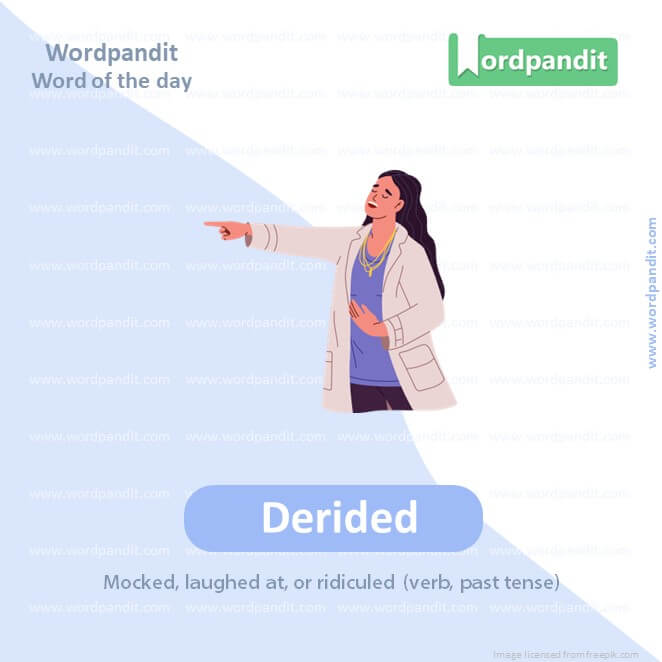
WORD-10: DERIDED
CONTEXT: They published books and essays on the subject, marched in demonstrations and spoke out in the media. They were continually derided as prudes and censors.
SOURCE: Indian Express
EXPLANATORY PARAGRAPH: Imagine laughing at someone because they slipped and fell while trying to dance. That’s called “deriding.” It means making fun of someone or something in a mean way.
MEANING: Mocked, laughed at, or ridiculed (verb, past tense).
PRONUNCIATION: dih-RYD-ed
SYNONYMS: mocked, ridiculed, scoffed at, scorned, belittled
USAGE EXAMPLES:
1. His new idea was derided by critics as impractical.
2. She derided the proposal as old-fashioned and out of touch.
3. The film was derided for its unrealistic plot.
4. They derided him for his outdated approach to management.
Vocabulary new Words
In the exuberant realm of language learning, nothing holds more thrill than the discovery of ‘vocabulary new words’. These gems of knowledge bring with them a fresh perspective and a deeper understanding of language. However, learning ‘vocabulary new words’ requires a methodical and focused approach.
The act of learning ‘vocabulary new words’ is a delve into linguistic novelty, often involving exposure to unfamiliar structures and meanings. Transcending the traditional approach of mere memorization helps in truly cementing newly learnt words into long-term memory. Interaction with a broad spectrum of written and spoken material, including novels, films, podcasts, and digital resources, provides a rich context of ‘vocabulary new words’ and significantly aids in their comprehension.
It’s noteworthy that unpacking ‘vocabulary new words’ is a steady process rather than a rushed one. A planned approach with a specific number of words, learned and reviewed each day, proves beneficial in effective learning. Coupling this method with technologies such as flashcards or memory-enhancement software can optimize the retention of ‘vocabulary new words’.
Integrating mnemonic devices and visual imagery is another highly efficient tool when learning ‘vocabulary new words’. Assigning unique stories or visuals to new words can enhance recall, making unfamiliar vocabulary much more approachable.
Lastly, practicing ‘vocabulary new words’ within daily routine is crucial for grasping their usage. Whether it’s through active utilization in conversation or incorporating these words in written communicative situations, application reinforces understanding.
In summation, mastering ‘vocabulary new words’ is an enriching pursuit that expands our linguistic horizons. However, a balanced approach, combining diverse reading materials, pacing your learning, employing memory-boosting strategies, and daily practice greatly streamlines the task. Embark on this fascinating journey, and let the ‘vocabulary new words’ fill your linguistic canvas with a fresh palette of expressions.







